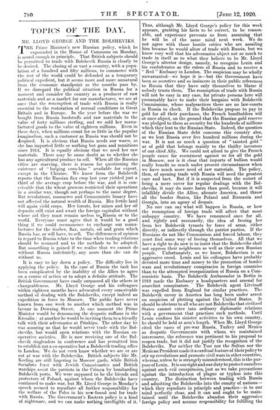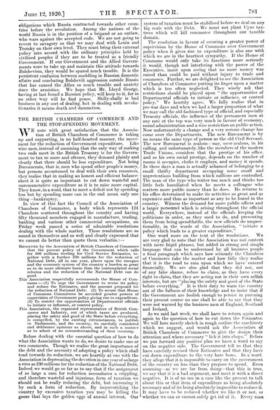TOPICS OF THE DAY.
31R. LLOYD GEORGE AND THE BOLSHEVIKS.
THE Prime Minister's new Russian policy, which he expounded in the House of Commons on Monday, is sound enough in principle. That British subjects should be permitted to trade with Bolshevik Russia is clearly to be desired. The closing of so vast a country, with a popu- lation of a hundred and fifty millions, to commerce with the rest of the world could be defended as a temporary political expedient, but it seems more and more unnatural from the economic standpoint as the months pass by. If we disregard the political situation in Russia for a moment and consider the country as a producer of raw materials and as a market for our manufactures, we see at once that the resumption of trade with Russia is really essential to the restoration of normal conditions in Great Britain and in Europe. In the year before the war we bought from Russia foodstuffs and raw materials to the value of forty millions sterling, and we sold her manu- factured goods to the value of eighteen millions. Even in these days, when millions count for so little in the popular imagination, such a customer as Russia was should not be despised. It is obvious that Russia needs our wares, as she has imported little or nothing but guns and munitions since 1914. It is equally obvious that we need her raw materials. There may be some doubt as to whether she has any agricultural produce to sell. When all the Russian cities are starving, there is reason for questioning the existence of " bulging corn-bins " available for export, except in the Ukraine. We know from the Bolshevik reports that the Russian flax crop last year yielded just a third of the average crop before the war, and it is con- ceivable that the wheat growers restricted their operations in a similar way, though not perhaps to the same degree. But revolutions, massacres and Communistic lunacy have not affected the natural wealth of Russia. Her fertile land will again yield crops. Her forests, her mines and her oil deposits still exist and await the foreign capitalist without whose aid they must remain useless to Russia or to the w world. Everyone must agree that it would be a good thing if we could recommence to exchange our manu- factures for the timber, flax, metals, oil and grain which Russia has, or will have, to sell. The differences of opinion in regard to Russia relate to the time when trading relations should be resumed and to the methods to he adopted. But something is gained if we realise that we cannot do without Russia indefinitely, any more than she can do without us.
It is easy to lay down a policy. The difficulty lies in applying the policy. In the case of Russia the task has been complicated by the inability of the Allies to agree on a course of action or to adopt a definite attitude. The British Government have easily surpassed all the others in changeableness. Mr. Lloyd George and his colleagues within eighteen months have advocated every conceivable method of dealing with the Bolsheviks, except indeed an expedition in force to Moscow. The public have never known from one week to another which method was in favour in Downing Street. At one moment the Prime Minister would be denouncing the despotic ruffians in the Kremlin ' • at another he would be inviting them to a friendly talk with their adversaries at Prinkipo. The other day he was assuring us that he would never trade with the Bol- sheviks, but would open relations with the Russian co- operative societies. He is now receiving one of the Bol- shevik ringleaders in conference and has permitted him to establish not a co-operative but a Bolshevik trading office in London. We do not even know whether we are or are not at war with the Bolsheviks. British subjects like Mr. Keeling are still lingering in Moscow gaols, while British Socialists feast with Jewish Commissaries and British warships assist the patriots in the Crimea by bombarding Bolshevik ports. We were supposed to be the friends and protectors of Poland, against whom the Bolsheviks have continued to make war, but Mr. Lloyd George in Monday's speech seemed to repudiate all further responsibility for the welfare of the Poles in his new-found zeal for trade with Russia. The Government's Eastern policy is a kind of nightmare, and we can make nothing intelligible of it. Thus, although Mr. Lloyd George's policy for this week appears, granting his facts to be correct, to be reason- able, sad experience prevents us from assuming that he will be of the same mind next week. We do not agree with those hostile critics who are assailing him because he would allow of trade with Russia, but we know very well that his adversaries object not so much to trade in itself as to what they believe to be Mr. Lloyd George's ulterior design, namely, to recognise Lenin and his confederates as the rulers of Russia and to receive a " Red " Embassy in London. The suspicion may be wholly unwarranted—we hope it is—but the Government have been so secretive and so insincere in their public references to Russia that they have only themselves to blame if nobody trusts them. The resumption of trade with Russia will not be easy in any case, for private persons here will presumably have to make their bargains with Bolshevik Commissions, whose malpractices there are no law-courts in Russia to check. If the Bolsheviks propose to pay in gold for all their purchases, the French bondholders will at once object, on the ground that the Russian gold reserve was pledged to them as security for the hundreds of millions which they lent to the Russian State. Indeed, the question of the Russian State debt concerns this country also, as we lent Russia over five hundred millions during the war. It is not so much a question of " tainted gold " as of gold that belongs mainly to the thrifty investors of our chief Ally. We could not afford to give the French people cause for resentment against us for all the gold in Moscow, nor is it clear that imports of bullion would really benefit us much under present circumstances when we have much more need of raw materials. The policy, then, of opening trade with Russia will need the greatest care and tact. But if it is suspected from the outset of being a mere cover for regular dealings with the Bol- sheviks, it may do more harm than good, because it will infallibly divide the Allies, alienate America, and throw all the border States, like Poland and Rumania and Georgia, into an agony of despair. No one can say what will happen in Russia, or how the resumption of foreign trade will affect that most unhappy country. We have renounced once for all, and rightly and necessarily, the idea of freeing her from her Bolshevik tyrants by force of arms, either directly, or indirectly through the patriot parties. If the Russians do not like Communism and forced labour, they must find some way of freeing themselves. All that we have a right to do now is to insist that the Bolsheviks shall not oppress their neighbours as well as their own Russian people. Unfortunately, as we know, Bolshevism is an aggressive creed. Lenin and his colleagues have probably devoted more time and money to the promotion of border wars and revolutionary conspiracies in foreign countries than to the attempted reorganization of Russia on a Com- munistic basis. The Bolshevik Ambassador in Berlin in 1918 made the Embassy a headquarters and arsenal for anarchist conspirators. The Bolshevik agent Litvinoff was expelled from England for similar practices. The Bolshevik envoy in America has long been under arrest on suspicion of plotting against the United States. It should be obvious to all who are not Bolsheviks that civilized States cannot enter into ordinary diplomatic relations with a government that practises such methods. Until Lenin confines his sinister activities to his own country, he should be held at arm's length. When Mr. Lloyd George cited the cases of pre-war Russia, Turkey and Mexico as despotic Governments with whom we maintained intercourse, the reference was pertinent to his proposal to reopen trade, but it did not justify the recognition of the Bolsheviks. For neither the Tsar nor the Sultan nor the Mexican President made it a cardinal feature of their policy to stir up revolutions and promote civil wars in other countries, whereas, unless he is strangely misunderstood, this is the pur- pose of Lenin. It is our right and our duty to protect ourselves against such evil conspiracies, just as we take precautions against the introduction of plague or typhus into this country. The distinction between trading with Russia and admitting the Bolsheviks into the comity of nations= which they repudiate in principle and practice—is to our mina perfectly clear, and it can and ought to be main- tained with the Bolsheviks abandon their aggressive foreign policy and assume responsibility for fulfilling the obligations which Russia contracted towards other coun- tries before the revolution. Among the nations of the world Russia is in the position of a brigand or an outlaw, who wars against the accepted code. We are not going to revert to savagery so that we may deal with Lenin and Trotsky on their own level. They must bring their external policy into accord with the ordinary principles held by civilized peoples if they are to be treated as a friendly Government. If our Government and the Allied Govern- ments were to take up and maintain this attitude towards Bolshevism, they would be spared much trouble. It is the persistent confusion between meddling in Russian domestic affairs and combating Bolshevik aggression outside Russia that has caused the Allies so much trouble and anxiety since the armistice. We hope that Mr. Lloyd George, having at last found a Russian policy, will keep to it, for in no other way will he find peace. Shilly-shally is bad business in any sort of dealing, but in dealing with revolu- tionaries it means death and damnation.







































 Previous page
Previous page